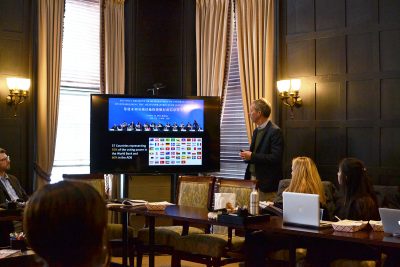
More than 15 students congregated at the Frederick S. Pardee School of Global Studies on Friday for lunch and a lecture, titled “Multilateral Development Banking for This Century’s Economic Challenges,” by Scott Morris, the director of the U.S. Development Policy Initiative.
The discussion was part of Boston University’s Development Banks and Sustainable Development lecture series. Kevin Gallagher, the co-director of BU’s Global Development Policy Program, introduced Morris to the group.
“You can’t really pick a better person for this than him,” Gallagher said. “Scott has a long history in working right at the cutting edge of many issues related to international finance. He’s bringing a variety of perspectives and expertise to this, and we’re really appreciative of him coming up here today.”
Morris spoke about his work on a high level panel convened by the Center for Global Development in which financial leaders from across the globe considered the future of multilateral development banking.
“It was an unusual opportunity to try and bring in these more senior officials, including at the level of leaders of countries, to really focus on what these institutions are all about,” Morris said. “If we’re going to look at all of these institutions as … being maybe part of a system, we need to think about what should we, as the global committee, want from them, and try to come up with an agenda, that really was the motivation and rationale for this panel.”
Morris then shifted the discussion to his panel’s findings and policy changes they ultimately recommended. He said the panel decided on five primary recommendations, ranging from building climate-friendly infrastructure to maintaining a contingency plan in case of crises.
“One of the things they had to decide for themselves is recommendations to whom?” Morris said. “What they decided in the end is this ought to be a message for the so-called shareholders of the MDBs. It makes sense to target those actors whose job it is to play the high level governance of these banks and set the agenda for the banks.”
He concluded the presentation by talking about President Donald Trump’s administration and a few different possible outcomes that might be seen from the change of power.
“You really do have to think through scenarios of how the U.S. might act in the years ahead that could look very different,” Morris said. “And frankly when you do these kinds of exercises, you don’t plan for the good outcomes. You have to plan for the bad outcomes, and if everything goes well that’s wonderful.”
Several students who attended the lecture said they found it to be very thought-provoking.
Francis Salome, a first-year graduate student in the Global Development Policy Program, said the discussion answered many of her questions, and left her thinking more about the topic.
“This taught me a lot, especially having read the report. It left me with a couple of questions, like what’s the future of MDB’s will be, and what role China will play,” Saloma said. “I am very interested in anything that is a development related, especially when it’s related to Sub-Saharan Africa.”
Samantha Robertson, a first-year graduate student in the program, said she was particularly interested to hear about the role of development banks in eradicating poverty and Trump’s potential effect on this development.
“I think it’s important to look at the current administration’s role in foreign policies, and especially in regard to development, so I’m very glad he included that portion of it,” Robertson said. “I thought it was a great talk.”




